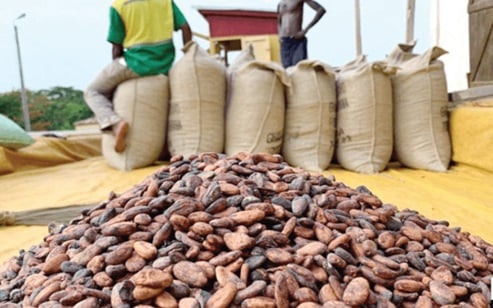The Ghanaian government faces a delicate balancing act as it prepares to announce the new cocoa producer price for the 2025/26 season. While global cocoa prices are soaring near historic highs, a strengthening Ghanaian cedi presents a unique challenge, potentially limiting the extent to which the government can increase the price paid to farmers. This intricate interplay between international market dynamics and local currency fluctuations has created a complex scenario with significant implications for both the government’s finances and the livelihoods of hundreds of thousands of cocoa farmers.
The crux of the issue lies in the cedi’s recent appreciation against the US dollar. As the cedi strengthens, each dollar earned from cocoa exports converts into fewer cedis. This means that even with record-high dollar prices for cocoa on the international market, the equivalent amount in cedis that the government can offer to farmers is inherently constrained. This creates a natural ceiling on the potential increase in the producer price, regardless of how well cocoa performs globally. The government is now faced with the difficult decision of how to navigate this economic reality.
The government has essentially two options: prioritize farmers’ income or maintain its own revenue stream from cocoa exports. The first option involves reducing COCOBOD’s share of export earnings. COCOBOD, the Ghana Cocoa Board, utilizes its portion of the revenue for operational costs, loan repayments, and stabilization buffers. Reducing its share would allow the government to pass on a larger proportion of the increased global cocoa prices to the farmers. This, however, could potentially strain COCOBOD’s ability to effectively manage the cocoa industry and invest in its future.
The second option is to maintain COCOBOD’s current share of export earnings. This approach would effectively accept the limitations imposed by the stronger cedi and limit the increase in the producer price. While this might ensure the financial stability of COCOBOD, it could leave farmers feeling shortchanged, especially given the historically high international cocoa prices. Finding the right balance between supporting farmers’ incomes and maintaining the financial health of the cocoa industry is a critical challenge for the government.
It’s important to understand that the “ceiling effect” created by the stronger cedi doesn’t necessarily mean farmers will be worse off than last season. The current farmgate price of GH₵3,100 per bag remains in effect, and any increase, however modest, represents a gain. The key question is how significant that increase will be. The government must decide how much of its own potential revenue from cocoa exports it’s willing to sacrifice to provide farmers with a more substantial price increase, pushing beyond the constraints imposed by the cedi’s appreciation.
The impending announcement of the new producer price carries enormous weight. For the over 800,000 Ghanaian families whose livelihoods depend on cocoa farming, this decision will not only determine their income for the coming season but also signal the government’s commitment to their well-being. The government’s approach to this complex situation will reveal its priorities and its strategy for balancing the fiscal realities of a stronger cedi with the needs of the backbone of Ghana’s most valuable export industry. The outcome of this decision will have a profound impact on the cocoa sector and the Ghanaian economy as a whole.














